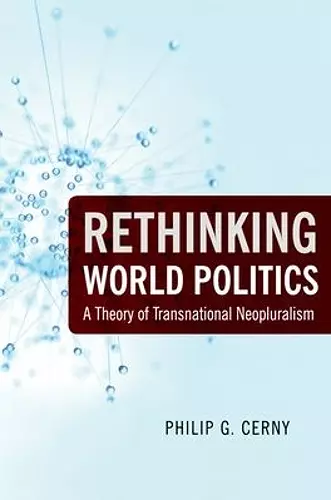Rethinking World Politics
A Theory of Transnational Neopluralism
Format:Hardback
Publisher:Oxford University Press Inc
Published:4th Mar '10
Currently unavailable, and unfortunately no date known when it will be back
This hardback is available in another edition too:
- Paperback£36.49(9780199733705)

Rethinking World Politics is a major intervention into a central debate in international relations: how has globalization transformed world politics? Most work on world politics still presumes the following: in domestic affairs, individual states function as essentially unified entities, and in international affairs, stable nation-states interact with each other. In this scholarship, the state lies at the center; it is what politics is all about. However, Philip Cerny contends that recent experience suggests another process at work: "transnational neopluralism." In the old version of pluralist theory, the state is less a cohesive and unified entity than a varyingly stable amalgam of competing and cross-cutting interest groups that surround and populate it. Cerny explains that contemporary world politics is subject to similar pressures from a wide variety of sub- and supra-national actors, many of which are organized transnationally rather than nationally. In recent years, the ability of transnational governance bodies, NGOs, and transnational firms to shape world politics has steadily grown. Importantly, the rapidly growing transnational linkages among groups and the emergence of increasingly influential, even powerful, cross-border interest and value groups is new. These processes are not replacing nation-states, but they are forging new transnational webs of power. States, he argues, are themselves increasingly trapped in these webs. After mapping out the dynamics behind contemporary world politics, Cerny closes by prognosticating where this might all lead. Sweeping in its scope, Rethinking World Politics is a landmark work of international relations theory that upends much of our received wisdom about how world politics works and offers us new ways to think about the forces shaping the contemporary world.
In the crowded marketplace of globalization studies, Philip Cerny offers a refreshing and ambitious entry...Cerny has performed an admirable service in offering this original vision of world politics in the new century. * Perspectives on Politics *
This is a remarkably sure-footed book and a thought-provoking read for anyone who is interested in system-level theorizing...an ambitious book that can be enjoyed equally by sympathizers and critics...Anyone who works on International Relations theory should have this book in their library. * International Affairs *
A sweeping Big Picture survey of global changes in areas as diverse as global finance, democracy and security...[Cerny] creatively remoulds existing concepts from diverse backgrounds to make them relevant for a rapidly changing global order...anybody interested in the larger transformative forces that are reshaping international relations will find this a stimulating and often provocative read...The book deserves a wide readership on both sides of the transatlantic divide. * Journal of Political Power *
A heroic effort at understanding the formidably complex global system that results from the interaction of states and of globalization. Cerny must be congratulated for the scope of his analysis and of his ambition. * Stanley Hoffmann, Paul and Catherine Buttenwieser University Professor, Harvard University *
In this wide-ranging and erudite book, Cerny probes the deep forces currently transforming the political structures underpinning ever more open societies and economies. His novel approach to understanding those forces deserves to be engaged and widely debated. Students of international political economy and related fields will learn much from grappling seriously with his core insights. * Louis W. Pauly, Canada Research Chair in Globalization and Governance, University of Toronto *
The study of international relations has traditionally been dominated by state-centric approaches. This book challenges students of international relations to think about world affairs from alternative perspectives and to question the applicability of traditional approaches to the 21st century. * David Baldwin, Senior Political Scientist, Princeton University *
Twenty years ago, Phil Cerny published The Changing Architecture of Politics (1990), one of the books that did most to reshape our thinking about politics, domestic and international, in the 1990s; Rethinking World Politics looks likely to be equally influential in the 2010s. Once again, Cerny successfully employs a wide range of sources, presenting new readings of otherwise familiar topics such as globalisation. Particularly valuable is his use of ideas drawn from classical American pluralism to flesh out his account of 'transnational neopluralism'. This is a book that will be widely read, and frequently returned to. * Chris Brown, Professor of International Relations, The London School of Economics *
ISBN: 9780199733699
Dimensions: 163mm x 236mm x 31mm
Weight: 612g
352 pages